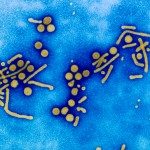Lien vers Pubmed [PMID] – 17133498
Hepatology 2006 Dec;44(6):1635-47
During a viral infection, binding of viral double-stranded RNAs (dsRNAs) to the cytosolic RNA helicase RIG-1 leads to recruitment of the mitochondria-associated Cardif protein, involved in activation of the IRF3-phosphorylating IKKepsilon/TBK1 kinases, interferon (IFN) induction, and development of the innate immune response. The hepatitis C virus (HCV) NS3/4A protease cleaves Cardif and abrogates both IKKepsilon/TBK1 activation and IFN induction. By using an HCV replicon model, we previously showed that ectopic overexpression of IKKepsilon can inhibit HCV expression. Here, analysis of the IKKepsilon transcriptome profile in these HCV replicon cells showed induction of several genes associated with the antiviral action of IFN. Interestingly, IKKepsilon still inhibits HCV expression in the presence of neutralizing antibodies to IFN receptors or in the presence of a dominant negative STAT1alpha mutant. This suggests that good IKKepsilon expression levels are important for rapid activation of the cellular antiviral response in HCV-infected cells, in addition to provoking IFN induction. To determine the physiological importance of IKKepsilon in HCV infection, we then analyzed its expression levels in liver biopsy specimens from HCV-infected patients. This analysis also included genes of the IFN induction pathway (RIG-I, MDA5, LGP2, Cardif, TBK1), and three IKKepsilon-induced genes (IFN-beta, CCL3, and ISG15). The results show significant inhibition of expression of IKKepsilon and of the RNA helicases RIG-I/MDA5/LGP2 in the HCV-infected patients, whereas expression of TBK1 and Cardif was not significantly altered. In conclusion, given the antiviral potential of IKKepsilon and of the RNA helicases, these in vivo data strongly support an important role for these genes in the control of HCV infection.


